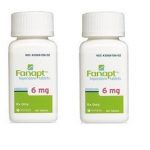Does Iloperidone Cause Weight Gain?

Why is my antipsychotic medication making me gain weight?
Every day a lot of patients go to their doctors with this same question. Besides food intake, there are many factors that influence one’s weight, including changes in lifestyle, level of physical activity, medical condition, and of course several antipsychotic medications. For most people, some factors change over time even if their diets don’t. For example, some people become less physically active with age, either from age-related fatigue or because they develop physical limitations. However, for many of these people, it is the type of antipsychotic medication they are taking.
Children appear to be particularly vulnerable to antipsychotic-induced weight gain. Studies indicate that most antipsychotics cause weight gain. However, the risk appears to be highest with olanzapine and clozapine.
These antipsychotics produce their weight and metabolic effects, predominantly, by increasing food intake which leads to weight gain that in turn induces metabolic consequences, but also through other direct effects on lipid and glucose metabolism independent of food intake and weight gain. Weight increases rapidly in the initial period after starting antipsychotics and patients continue to gain weight in the long term.
What is Iloperidone?
Iloperidone more commonly known by the brand name (Fanapt) is an antipsychotic medication used to treat the symptoms of schizophrenia (a mental illness that causes disturbed or unusual thinking, loss of interest in life, and strong or inappropriate emotions). Iloperidone is in a class of medications called atypical antipsychotics. It works by changing the activity of certain natural substances in the brain.
Iloperidone comes as a tablet to take by mouth. It is usually taken with or without food twice a day.
Your doctor will probably start you on a low dose of iloperidone and gradually increase your dose, not more often than once every day for the first 7 days. Your doctor will also need to start you on a low dose of iloperidone and gradually increase your dose if you do not take iloperidone for 3 days or longer at any time during your treatment.
Does Iloperidone Cause Weight Gain?
Yes, like many other antipsychotic medications, studies have shown that Iloperidone (Fanapt) can cause weight gain, people taking Iloperidone gained an average of 2.3 kilograms in clinical studies that lasted between 4 to 6 weeks.
However, research has also shown that as compared to Olanzapine, Iloperidone (Fanapt) has a much lower weight-gain liability.
Can Iloperidone (Fanapt) make me feel sleepy?
Iloperidone (Fanapt) can cause sleepiness. Be careful driving or doing anything that requires mental alertness until you know how this medication affects you.
Can I drink alcohol while taking Iloperidone (Fanapt)?
Avoid drinking alcohol while taking Iloperidone (Fanapt) because it can worsen some of the side effects, such as dizziness and sleepiness.
What are the other likely side effects of this medication?
Get emergency medical help if you have signs of an allergic reaction: hives; difficult breathing; swelling of your face, lips, tongue, or throat.
High doses or long-term use of iloperidone can cause a serious movement disorder that may not be reversible. The longer you use iloperidone, the more likely you are to develop this disorder, especially if you are an older adult.
Call your doctor at once if you have:
• fast or pounding heartbeats, fluttering in your chest;
• a light-headed feeling, like you might pass out;
• uncontrolled muscle movements in your face (chewing, lip-smacking, frowning, tongue movement, blinking or eye movement);
• tremors, slow muscle movement, muscles pain or stiffness;
• confusion, agitation, thoughts of hurting yourself;
• loss of bladder control;
• penis erection that is painful or lasts 4 hours or longer;
• high blood sugar–increased thirst, increased urination, dry mouth, fruity breath odor;
• low white blood cell counts–fever, chills, sore throat, mouth sores, skin sores, cough, trouble breathing; or
• severe nervous system reaction–very stiff (rigid) muscles, high fever, sweating, confusion, fast or uneven heartbeats, tremors, feeling like you might pass out;
Older adults may be more likely to have side effects from this medicine.
Common side effects may include:
• dizziness, drowsiness, tired feeling;
• dry mouth, stuffy nose; or
• fast heart rate.
This is not a complete list of side effects and others may occur. Call your doctor for medical advice about side effects. You may report side effects to FDA at 1-800-FDA-1088.





